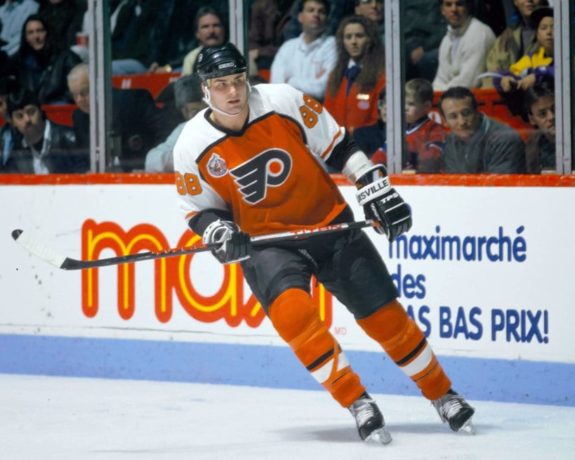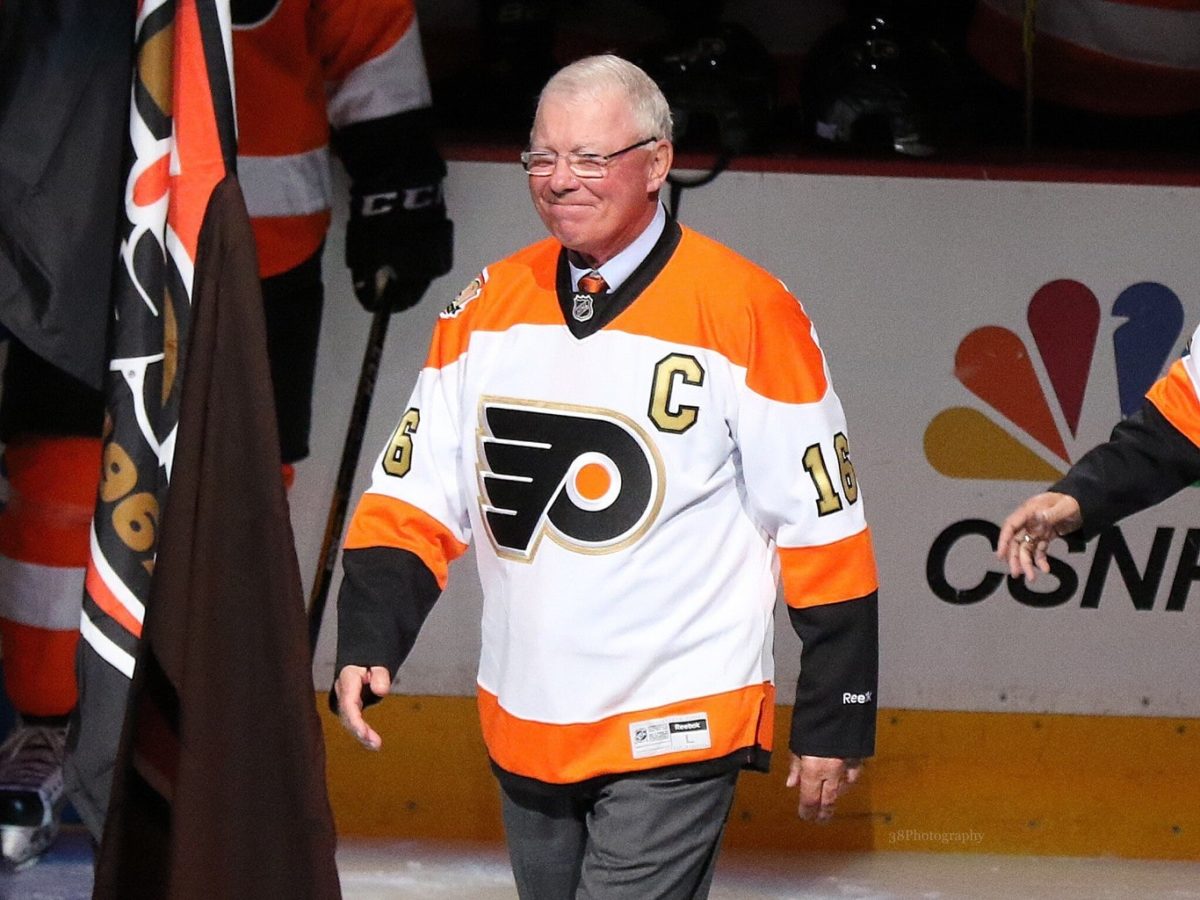Bobby Clarke: The Ultimate Philadelphia Flyer – Hockey Writers – Flyers History

The Philadelphia Flyers Hall of Fame is a place of honor where only the best have been able to find themselves in it. Arguably the franchise’s best player, Bobby Clarke, was one of the first to find himself here back in 1988.
Clarke has been with the Flyers organization throughout its history. He was a popular player on the ice and took his skills to the world of management where he served as the team’s general manager (GM) twice, and serves as the team’s executive vice president today. What did he do to earn so much fame?
Prototypical Broad Street Bully
When Clarke was drafted in the second round of the 1969 NHL Draft, no one expected him to become a franchise player. An underrated forward with excellent skill and grit, the potential was there, but the belief in him was lacking in many NHL franchises. Throughout his time in Philadelphia, he proved his small stature of 5-10 feet.
Clarke was the face of the Flyers’ ‘Broad Street Bullies’ era in the mid-1970s. Sure, those rosters had talent, but they combined that with a level of physicality unmatched by anyone in the NHL. He was one of the smartest of them all, but he was also one of the most talented.
Clarke emerged as a true star in the 1972-73 season, where he scored 104 points and accumulated 80 penalty minutes in the program as team captain. From his rookie campaign in 1969-70, until he became the first Flyer to reach the 100-point mark in franchise history, he got better and better. As a result, so did the team.
In 1973-74, Clarke traded points for penalty minutes. He had 87 points and 113 penalty minutes, and the rest of the team followed suit. The Flyers’ 1973-74 campaign was one that defined the 1970s. The captain led a team of guards, including Dave Schultz, Bob Kelly, and Don Saleski, and a team of stars, including Bill Barber, Rick MacLeish, and Bernie Parent to the Stanley Cup Finals with a 50-16-12 regular season record.
Against the clear favorite Boston Bruins, he scored one of the team’s greatest goals ever in Game 2 when he scored the game-winning goal in overtime that tied the series at two at the Boston Garden. The Flyers were notorious for winning games on the road in Boston, and they needed to exorcise those demons to win the series. They also became the first expansion team to win the Stanley Cup.
Clarke and the Flyers repeated what they did in their previous season in 1974-75, winning another Stanley Cup. The captain had his best season to date, scoring 116 points and winning the Hart Trophy as a result. In both the regular season and postseason, he led the league in assists.
As an individual, Clarke reached his peak production in 1975-76 when he scored 119 points and won his second consecutive Hart Trophy that season. In the Flyers’ quest for three consecutive Cups, they fell short in the Stanley Cup Final against the Montreal Canadiens.
Clarke was still a great player for years following the days of the Broad Street Bullies, but he wasn’t at the same level in terms of points. He has consistently averaged 65 or more points throughout his career as long as he is healthy. He had memorable post-prime seasons in 1979-80 when the Flyers went to the Stanley Cup Finals, and finished 10th in Hart Trophy voting that season, and another great campaign as a 33-year-old in 1982-83 when he won. the Selke Trophy.
You may also like:
Clarke hung up his skates following his 1983-84 campaign, having accomplished nearly everything in the NHL. He had 60 points in 73 regular season games, and three points in three playoff games, but the team was not at the same level as it was a decade ago, so the decision was easy.
Ultimately, Clarke finished his time in the NHL with 358 goals and 852 assists for 1,210 points in just 1,144 games, all with the Flyers. Since then, only Claude Giroux has scored 1,000 points and 900 points. In addition, he finished with 119 playoff points in 136 postseason games – both records. His consistent dominance has remained untouched since his retirement, which is why he is not only in the Flyers Hall of Fame but also in the Hockey Hall of Fame.
First stint as GM
Shortly after retiring as a player, Clarke chose to stay with the franchise as their GM entering the 1984-85 season. While the roster was built entirely by previous managers, he took over and began turning the Flyers around following three straight seasons of first-round losses in the postseason. In his first season as general manager, he took one of the youngest rosters in the NHL to the Stanley Cup Final.
Related: Flyers’ 1984-85 Team Was Pure Youth Showcase
Clarke and his club fell to the Edmonton Oilers in just five games, and would fall to the same foe in the 1986-87 Stanley Cup Final in seven games. He didn’t make a big move to contribute to any of this, but his retention of a core of players like Tim Kerr, Brian Propp, and Mark Howe made for continued dominance.
The Flyers did not return to the Stanley Cup Finals during Clarke’s time with the team, largely due to aging stars. His time as GM was over after his 1990-91 campaign after missing the playoffs in consecutive seasons beginning in 1989-90. Luckily for him, it wasn’t long before he found his job.
Clarke Returns as GM
After the Flyers missed the playoffs for three more seasons when Clarke left, Philadelphia returned to him to be the GM. This time, his tenure will be long, eventful, and involve some drama.
Clarke’s first time as GM was not without problems. The second one couldn’t get past this case, as infamous Eric Lindros during the peak of fame during his time in charge.

Clarke struggled in the trade market early on, reacquiring goaltender Ron Hextall after his predecessor traded him in the deal that brought Lindros to Philadelphia, but also acquired star forward John LeClair and star defenseman Eric Desjardins from the Montreal Canadiens to get the win. Mark Recchi. As a result, those deals were lucky with the team.
The Flyers made the playoffs in 1994-95 with honors, and Lindros became the team’s first Hart Trophy winner since Clark did it in 1975-76. Making the Eastern Conference Final in his first season back, he gave himself a long time.
Lindros’ tenure culminated in the 1996-97 season when the Flyers reached their first Stanley Cup Final since 1986-87. While they were swept aside by the Detroit Red Wings, a reasonable expectation would be that they will dominate for years to come as long as they keep their core strong. That didn’t happen, and everything fell apart after that.
The Flyers still had a similar level of success in terms of making the playoffs, but the drama surrounding Clarke and Lindros took away much of that. Neither of these two was a big fan of the other, all due to a collapsed lung, family drama, blaming the middle man when the team failed, and a media circus that made their feud a big deal.
The Flyers moved on from Lindros following the 2000-01 campaign in which he missed the entire season, but Clarke did not replace his talents. Despite losing one of his star players, he never failed to qualify for the playoffs during his tenure as GM. Once the Lindros controversy ended, the Flyers had a consistent early exit except for 2003-04, when they reached the Eastern Conference Final.
Clarke’s GM story ended at the start of the 2006-07 season when he resigned as the team struggled. He never brought back a Stanley Cup to Philadelphia in any of his GM roles, but he maintained a winning tradition in the city. All the issues aside, he was one of the best GMs the team has ever had.
Clarke’s Work Today
Today, Clarke serves as an executive vice president for the Flyers. This is a position he has held since stepping down as the team’s GM in 2006-07 and may hold as long as he chooses.

Clarke has found ways to bring controversy into the modern day, but the drama has never been the same as when he was GM. He has little influence in the organization, but remains an important figure to this day. Since Clarke has been involved in Flyers affairs for a long time, it is clear that he is respected.
Clarke spent a lot of time off the ice for the Flyers, but it was his play that earned him a place in the team’s Hall of Fame. He still holds many of the club’s records to this day, so the induction is well deserved. While the title of the greatest Flyer of all time remains somewhat of a consensus, it may be a while before anyone can hit him with certainty.

Source link




